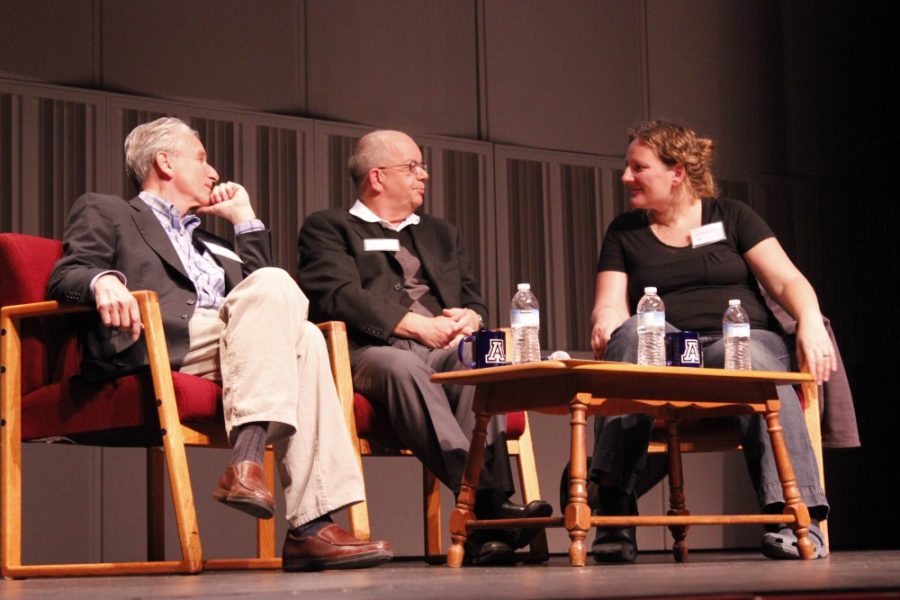Crowder Hall opened its doors to those curious about religion and science, and how they intersect at a campus event Monday night.
The event, “Love Thy Neighbor? Biology, Altruism, and Why We Do Good,” drew a large audience that filled every seat in the lecture hall.
Students, faculty, and community members witnessed a discussion between Jeff Schloss, a distinguished professor and T.B. Walker chair of biology at Westmont College, and Anna Dornhaus, an associate professor of ecology and evolutionary biology at the UA. The two scientists brought contrasting perspectives to the discussion in order to carry out a well-rounded debate.
Many on-campus organizations, including Chi Alpha, Cru, Christian Challenge, Graduate Christian Fellowship and others, worked diligently to coordinate and host the free event. They sponsored the Veritas Forum, an organization that works to “engage students and faculty in discussions about life’s hardest questions and the relevance of Jesus Christ to all of life,” according to its website.
Jim Firnstahl, a member of the UA’s Veritas Forum, spoke about the main goal of the night’s program.
“The reason we put these on is to stimulate questions in people’s minds that they already have about the meaning of life,” Firnstahl said. “What we’d like them to come away with is the idea that there is a larger picture beyond themselves.“
This is the fourth year the Veritas Forum has been to the UA campus and after last year’s success with a debate-style forum, this year’s event was organized in the same way. The audience was also able to text questions to the scientists while those who did not get a seat could stream the video through a webcast, Firnstahl added.
The event began with the introduction of both speakers and their own perspectives regarding altruism, or the intent to help someone even at a personal cost.
In Dornhaus’ introductory statement, she defended the evolutionary theory of altruism by using examples of animal behavior in history. She acknowledged the idea that altruism is a trait that could have been passed down through generations and although people have control over their specific actions, brain wiring plays a distinct role in their desire to do good. She did not identify herself as linked to one particular religion.
Schloss, who identifies as a Christian, distinguished biological trends as valid, but ultimately supported the idea that beliefs and religion lead to genuine altruism, which suggests that humans are capable of acting out of their own hearts.
Following their introductions, Dornhaus and Schloss participated in a conversation that further debated the influence of biology on altruism.
After the scientists finished their discussion, the floor was open for audience members to ask questions. Dornhaus acknowledged the significance of this very candid and raw portion of the program.
“I think it is important to engage students and other members of the campus community intellectually and allow them to think about daily issues and how science and research relate to them directly and indirectly,” she said.
One audience member proposed the idea that humanity is incapable of doing things out of the good of their own hearts, to which Dornhaus responded by saying that there is a sense of pessimism that many associate with people that she doesn’t agree with.
Both scientists agreed that time will lead to further discussions regarding altruism, but the kindness of the human heart, biological or not, should not be undermined.









